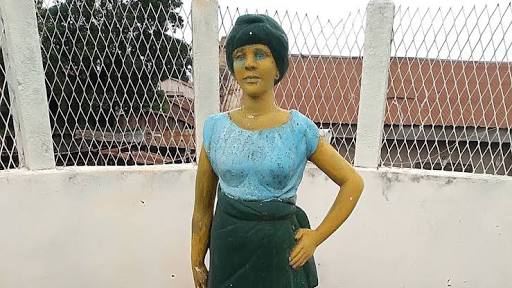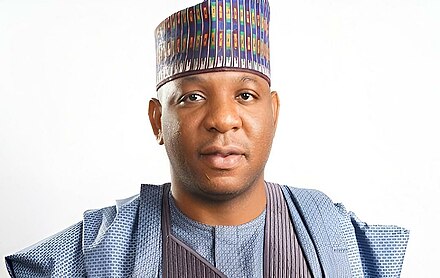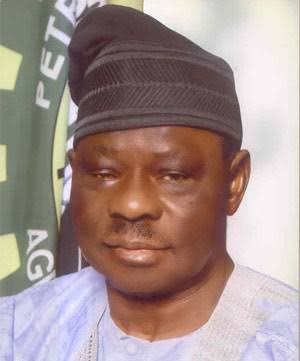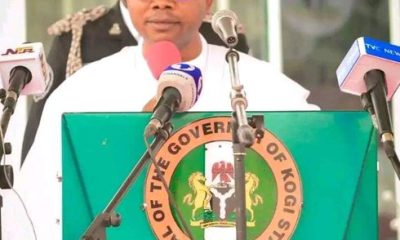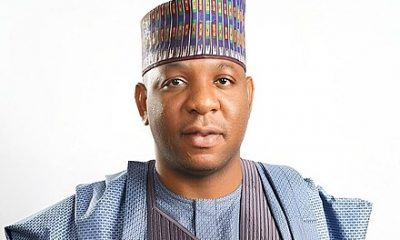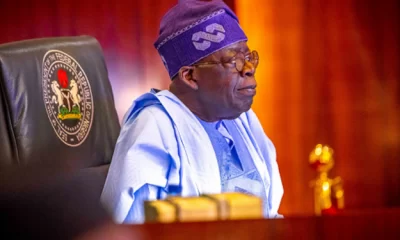Opinion
Attempts to rewrite Igala history: Issues in perspectives

By Prince Akogwu Omaga
It was the famous German writer/philosopher, Johann Wolfang Van Goeth who said, “He who cannot draw on three thousand years is living from hand to mouth.”

The quotation above raises many questions because to trace your lineage to three thousand years is a difficult task, many people do not even know their family tree to the 10th generation, especially in Africa where documented records have been largely limited.
However, archeological discoveries are helping to decipher the migration from the Upper and Lower Nile. Even though, the history of Africans and Igala people is clearly embedded in the Khemet civilizations, it was written and rewritten in different ways by early European writers as such; there are many versions of the history of the people whose forebears have lived beside the two Nigeria’s monumental rivers Benue and Niger for centuries.
Some of the early documented histories were written by writers whose sources of information remained questionable and also fall short of historical facts due to existing evidences to suggest otherwise. Some versions were written by early Nigerians historians who relied majorly on the works of European whose source of information is less than credible. It is not easy to deduce that some historians and writers were driven by the quest to deconstruct and rewrite in favour of certain ethnic group to alter fundamental truth about Ancient Egyptian.
Thus, it is easy to figure out why some historians and early writers referred to Igala as a sub-Yoruba group, some claimed that the Igala people and their kingship is of Benin origin and others said Igala came out of Jukun. There are also others who claimed that the inhabitants of the present Igala enclave were Igbos and Yoruba before Jukun came and acculturated them and that is how Igala language came about.
These historical falsehood gains ground and accepted to the extent that many modern day writers continue to quote historical falsehood and you know lies told many times takes the resemblance of truth. While the Igala people had had relationship with these groups in the course of time and history, there is nothing to suggest that these outrageous claims represent the true history of the Igala people.
The Ife and Nok civilizations are cultures that were brought down from Egypt, though some claimed Yemen and Mecca due to Ifa oracle words that appeared the same.

However, archeological evidences is pointing to the fact that the Lower and the Upper Nile referred to as Khemet (the black land) now called Egypt was the cradle of black civilization before dispersal to West Africa and other regions within the continent. The Igala history of migration from Egypt is not in doubt and it remained the only ethnic group in Nigeria that retained the ancient Nilotic culture completely, which can be seen from the customary rites to ascension of an Attah Igala, costume of Igala royalty, the pattern of the journey of no return of an Attah and most remarkably Igala words resemblance with those of the Ancient Egypt language and of course other ancient languages across the world like the Arabic, Jews, Greek and Spanish.
The fact is that Igala also called (Gala/ Gara) as an ethnic group is reckoned as one of the ancient groups in the Upper and Lower Nile Valley, and an Igala sub-clan of Igalaogba greeted ANU are still recognized through archeological excavations as one of the ancient sub-Igala cum Khemetic group in Ancient Egypt up till these days. The Igalamela sub-Igala clan is a rich repository and custodian of Nilotic cultures and Igala Kingship heritage brought from Egypt and the Ife people who are found in the Benue valley remained the realistic face of the civilizations and heritages that is akin to the Benin, Yoruba, Igala, Nupe, Plateau and Southern Kaduna ethnic groups and other groups whose ancestors were among those who sojourned in Wukari after their earlier meeting of Igala by Jukun in the present Borno axis in the course of migration from Egypt.
I was compelled to write this treatise because there had been no time that the history of Igala people have been told by neighbors (other ethnic groups) based on falsehood or half truth, that is continually peddled, for some it is the quest for ethnic superiority and for others it is for political and economic advantage at the expense of Igala people who have been deprived of their status and sense of belonging lately.
Upon the Federal High Court judgment last year (2020) which ceded the ownership of Ajaokuta, Lokoja and Koton Karfe to Igala kingdom, the media space especially the social media became a veritable platform to write different versions of history which from all indications fall short of historical facts and available evidences. The story of migration of Ebira Koto and Ebira Tao people were riddled with gaps and holes. For instance, the Ohimege of Koton Karfe claimed that the Igala people and Ebira Koto and Ebira Okene migrated from Yemen and sojourned in Wukari before coming to Idah and subsequently, relocated to their present abode in protest because their forebears were not considered for the Attah Igala kingship stool, nothing can be farther from the truth.
Even though, there is a school of thought, which is of the opinion that the Ebira people were part of Abutu Ejeh famous migration from Wukari to Idah. The notion that the Igala people were ruled by Igalamela chiefs prior and that the stool of Attah Igala kingship was founded by Abutu Ejeh and his kiths and kins does not represent historical facts available.
The Igalaogba, Ife and Igalamela clans have sojourned at the areas of Rivers Benue and Niger for many centuries. The work of the famous archeologist, Thurstan Shaw indicated that Idah the seat of Igala kingdom is dated to the 9th century and at the moment attention is shifting to Ife land in the Benue Valley as the cradle of civilization of those with Ife and Nok cultures which predates Idah.
The Attah Igala stool was instituted by these Igala clans many centuries earlier not about 400-500 years ago that Abutu Ejeh led the migration from Wukari to Idah. Infact, the stool was rotated between Igalamela and Igalaogba and the seat of power was at Opu Attah an enclave that still exists at the heart of Idah native town. The Ife people who refused to proceed to Idah in the course of an earlier migration remained in Ife by the Benue Valley and had launched the bid to take the Attah Kingship stool from Olema II who forcefully took over through revolt after against the wishes and will of all members of his Igalaogba clan and Igalamela clan as it was agreed to chose from among Ife people.
This was the situation before Abutu Ejeh and his entourage came to Idah, therefore, it is hard to imagine that the Ebira people ever had the privilege to contest for Attah Igala Kingship stool at the time they followed Abutu Ejeh from Wukari to Idah even though there are no record to suggest that the Ebiras were part of the flight to Amagede enroute Idah even though our very unreliable or insufficient oral tradition does agree. Whatsoever was the case, the Igala people had settled across in the left and right sides of Rivers Benue and Niger before Abutu Ejeh came from the Upper Benue River.
There were Igala settlements in Igu now Koton-Karfe and indeed among the people of Koton-Karfe are those whose forebears lived in Igu before the people who call themselves Ebira today came to live among them about 400 years ago. That is why Umaisha (Ohelewu) the second Panda Kingdom instituted by Attah Igala after Igu and Abaji. Ohelewu is the original name of Umaisha, an Igala enclave across River Benue. When Kogi State was created in 1991 some groups from Doma Kingdom, the Alago people protested and demanded to join Kogi State because of their Igala ancestry. J.S. Boston, excursion and research to Doma Kingdom in the 1960s reveals and buttress the notion that the left and rights sides of Rivers Benue and Niger were Igala settlements. “the core or proper Igala people controlled the major parts of Nigeria then” (Boston, J.S, The Igala Kingdom, Nigerian Institute of Social and Economic Research, Oxford University Press, 1968; & Clifford, G.M.).
The same way Lokoja the confluence of the two monumental rivers in Africa was an Igala settlement. Ajaokuta as the name denotes is an Igala name and the aboriginal people who live in Ajaokuta are Igala along that way to Agenebode, Ifeku, Emu, Illah and Asaba were Igala settlements at the early time. Though, Igala lost all these settlements along the Rivers Benue and Niger due to imaginary and artificial boundaries created by the Europeans, the British colonial masters. Ajaokuta and Lokoja were not lost in such circumstances, it was leasing and at the request of Queen Victoria for farm resettlement that Ajaokuta was given out and were strategic Igala settlements from the earliest time. There were Igala settlements in Ihima area more than 450 years ago because the Igalaogba, Ife and Igalamela groups after many centuries move out to populate many open spaces far beyond 500 years that the Ebiras claimed they came from Wukari with Abutu Ejeh.
On Ajaokuta issues about the first settlers continued to surface on the public space before the vital judgment. The British colonial government was confronted with the repercussion of the balkanization of Igala territory not only about sphere of influence but that people who lived in these places and are first settlers. An investigation by Mr Dewar and Attah of Igbirra, Ibrahim Onoruoiza in the late 1930s resulted in these findings and proposals that: Ajaokuta is a cosmopolitan village founded by Igala from the opposite bank of the Niger. The first village head was Obansa, an Igala. The Attah Ibrahim at the time propose to appoint the eldest surviving son of Obansa (The Igala man) by name Labiyo (Ila-biyo) to the Village headship and presidency of a strong council. Anything Igbirra councilor from Okene to supervise local administration is to be avoided for it will not be accepted by the people. Even though the decision taken at the time was not firm because river was not a natural boundary for Igala people from the time in memorial, as stated earlier, they lived on both left and right sides of Rivers Benue and Niger.While the findings and proposals clearly denotes the obvious facts of ownership of Ajaokuta land by Igala people. The 28 February 1939 memorandum No. 851/19A sent to the Secretary of Northern Province and copied the District Officer of Igbirra Division and the Acting Resident in which paragraph 5, an excerpt stated that: As Ajaokuta is not directly affected by Igbirra law and custom is a enough reason. The memorandum fall short of resolving the issue eternally by returning the community to Igala traditional council at the time in 1939. Invariably, British colonial government’s preference to use the Rivers Niger and Benue as natural boundary affected many Igala people and their heritages; some were compelled to adopt other cultures and languages that are not Igala in Delta, Anambara, Edo, Nasarawa States, Benue, Cross River States etc (The 28th February, 1939 MEMO to the Secretary of Northern Nigeria).
On the issue of ownership of Lokoja, there is no contest over this historical fact that it was indeed an Igala settlement. Attah Ameh Ocheje was the one who gave Lokoja to the British for 700,000 coweries out of which 160,000 coweries equivalent of forty five pounds at the time. The balance was not paid until the expiration of the lease agreement 99 years after. The treaty was titled: The treaty between the Queen of England and Igala Country. Queen of Britain was represented by Bundus Trotter, Commander William Allen and William Cooks Esquire and the representatives of Attah Igala. The treaty document can still be found at Arewa House, Kaduna, Kaduna State, British Archive in London and Attah Igala Palace, Idah.
Before Lokoja became the Federal Capital of Nigeria, Lord Lugard stayed in Itobe and Ajaokuta. The cenotaphs in memory of Nigerian soldiers who fought in the First and Second World Wars (1914-1918; 1939-1945), the weapons used during Nigeria-Cameroon War (1914) and East Africa (1918), at the cenotaph in Lokoja it was clearly stated that Lokoja was under Itobe, a centre of commerce under Attah Igala leadership. The relics of Lokoja said it all. The names of communities like Ganaja was coined from Anaja an Igala Naval Chief who was assigned there in 1831 by Attah Ekele Aga and Adankolo was from the name of an Igala chief called Ada Okolo (Omachoko, F. Arise Igala Magazine, May-June, 2020, Issue 56)
The idea of using the influence of the federal government to shortchange the Igala people to collect their heritage and give to Ebira people cannot stand because there are overwhelming evidences to support the claims of Attah Igala to ownership of Ajaokuta, Lokoja,and Koton Karfe. Igala cannot be deprived of the patrimony of their forbears by those who graciously benefit from their kind gestures. A political leader, a president or governor who refused to acknowledge the facts of Igala history and ownership of these communities and decide to stampede the Igala people will not win the battle at the long run. Let me point out here that, Igala nation was recognized by international law as evident in different treaties it signed with Great Britain as a sovereign power on equal parity of which J.S. Boston described Igala as “holding all the ramifications and accoutrements of sovereignty and political authority. The British authority acknowledges Igala nation state under the suzerainty of the Attah Igala, with a territory that encompass largely what we have today as Federal Republic of Nigeria. Sultan Bello, of the Sokoto Caliphate admitted this fact of history which was well alluded in Burdo Adolf’s Voyage up the Niger and Benue –London 1880, Journal of African Society Vol.7, 1907. They know and understand that the territories within and at both banks of the Rivers Niger and Benue to far flung territories all the way down to the ocean belong to the Attah Igala (Oguche, F. Legal Approach to Recover the Lost Dignity and Position of Igala People, Arise Magazine 2020, Vol. 56). From the foregoing, it is understandable why communities that are now cities of Port-Harcourt and Calabar were originally called Igala: Igu-Ocha (Port-Harcourt) and Atakpa (Calabar).
The history of a legendary figure called Abutu Ejeh who became synonymous with the Ancient city of Idah and often mentioned and represented as a Jukun even though his names and those of his children were Igala. I can understand why, but cannot accept it because it fall short and fail to poses the semblance of historical fact in concrete term. Now, who is Abutu Ejeh? He was referred to as a Jukun prince who lost out in the bid to assume the stool of Aku Uka of Wukari by European writers and was continuously quoted by those who never bother to embark on further research on their own to find out especially that Jukun and Igala don’t bore similar names despite the confederation which started from the Borno axis to Wukari by the Upper Benue. Let look back at our history of migration and early interaction with Jukun.
There are still footprints of Igala people in Borno with the famous kinship stool of Attah Gara Gwoza and the relics at Ngala in the present Borno State. It was upon the Jukun meeting of Igala groups at Borno region and signing of a security pact with Jukun, that confederacy was established. They later moved to the present area of the Upper Benue (Wukari) as a seat of the confederation. It was in Wukari axis that disagreement ensued because Jukun warriors insisted they should produce the king. The Igalaogba and Ife people were the first groups who left Wukari for Ife by the Benue Valley where they stayed for sometimes, many others cross over on the left sides of Rivers Benue and Niger in the present Nasarawa state axis. The Igalaogba and Ife people had muted the idea of starting the Attah kingship by the Benue valley before Igalaogba people left for Idah and subsequently Igalamela people moved down perhaps sailed through River Benue to Ife in the Benue Valley and proceeded to Idah where the Attah kingship stool was instituted. While it is not clear why the groups migrated from Wukari so early, but it can be attributed to the growing population and the struggle for resources and perhaps, the conscription of their children as fighters/warriors and perhaps the attempt by Jukun to rule a people who came with a rich royalty from the Lower and Upper Nile.
It is not difficult to decipher that the forebears of Abutu Ejeh who from all indication were of Igala royal clan had ruled in the Borno axis in the earliest attempt to establish the Attah people dynasty, (father of all), they refused to move along and preferred to remain at Wukari until many failed attempt to reinvent the Igala dynasty of the so called confederation (Quorarafa later corrupted by Hausa in Kano who were victims of invasions by Jukun and Igala warriors who later settled in the present Bebeji, Yankassai and other locations in Kano. Now let go back to Abutu Ejeh more often referred to as a prince of Jukun royal court. Abutu Ejeh certainly cannot be a Jukun man just because he came from Wukari. The Igala groups in the Lower Benue and Niger Valley had also lived in Wukari centuries and left many groups beside River Benue as they migrate down to Ife enroute Idah. Abutu Ejeh ancestors refused to follow his kith and kins that had left Wukari many centuries earlier to Idah through Ife by the Benue Valley. Abutu is not a name that is commonly attributed to Jukun, likewise Ejeh, Amichi (Ebulejonu), Idoko, Ayegba, Names are very important and can be glean when people preserve their three of knowledge. The family three was among the first tree of knowledge. Jukun names are quite very different from Igala names and one should not find it difficult to realize that anytime there is migration some people for one reason or the other do not join the migration. Abutu Ejeh ancestors and others did not moved with the Igalaogba and Ife groups at the earliest time and also the later migration of Igalamela group to Idah. Today, we still have people of Igala descent at Askia-Uba, Ngala and Atagara in Borno State. Some can still be found in Wukari in Taraba State, there is Atagara in Yobe and Kebbi respectively whose forebears did not migrate to Idah. Thus it’s not enough to conclude that because Abutu Ejeh came from Wukari, he is a Jukun descent. Why? Everything about Abutu Ejeh and his children points to the fact of Igala origin even though he may have arrived with those who have Jukun origin or mixture of Jukun and Igala parentage (Abdullahi, Ayegba; (2019), Indigenous Igala People, How Many States Can We Found You in Nigeria and Beyond).
Even though many writers have advanced the notion that Abutu Ejeh was a Jukun therefore place Jukun ahead of Igala. In contrast, Jukun royalty acknowledges the fact that their forebears met the Igala people in Borno. J.S Boston who did a great of research in the 1960s described the Jukun as Ahel Dirk, he called the Gara Aborigines. Erroneously in a book titled: Nigeria: The Jewish Dominated Nation described the Jukun as the parent stock: “The Agabaidu of Wukari (Kwararafa Kingdom) in Taraba State Nigeria called Aku Uka. The present stock for most Edomites spreading to many parts of Nigeria and West African regions are the Jukuns whose king is Agabaidu, Aku Uka of Wukari”. Looking at the Ancient Egyptian people, there is no where that Jukun was mentioned but Ata, gala, gara, Anu (Igalaogba) were mentioned many times thus Jukun overnight supremacy was concocted to support the idea that Abutu Ejeh was a Jukun from Wukari and to rewrite Igala history that is the only link of many African and Nigerian ethnic groups to the Khemet (Ancient Egypt) see (King ,L.W. (2005), History of Egypt, https://gutenberg.org/files ).
This is not the historical fact and the present Aku Uka of Wukari acknowledges to certain facts of Igala and Jukun relationship when the Attah Igala who travelled and will never return, Attah Idakwo Ameh Oboni II visited him few years ago supposedly to pay homage. He changed his perception of Jukun ancestry of Abutu Ejeh the progenitor of Attah Ayegba dynasty and that the so called oral tradition which we often rely upon is less than credible. In fact, J.S Boston questioned Igala oral tradition when he noticed that Igala royalty knew little about people who claimed to be of Igala descent. He was never told at Idah that they were people across River Benue in the present Nasarawa State that are of Igala origin. Boston acknowledges that as far as 12th century there was migrations from Idah. Though Boston himself did not know enough when he visited Doma Kingdom that they had always had Igala people on both sides of the Rivers Benue and Nigeria as early as 7th, and 9th century when the first group of Igala migrated from the Upper Benue, Wukari to Ife by Benue valley enroute Idah.
Ayegba Abdullahi, a physicist, and the researcher that Attah Idakwo Ameh Oboni II appointed as an Igala Ambassador to reconnect all people with Igala heritages and people, at the last count has reconnected with many Igala groups across Nigeria, Africa, Caribbean and the U.S. The study of Ancient Egypt has been taken to another level, the exploits has led to many information on the lineage of man and the Ancient Egypt where the Igala (Ata) was recognized as the 4th Pharaoh of the First Dynasty of the early Khemets civilization. Just as Professor Gabriel Oyibo of the GAGUT famed said some years ago at the twilight of his Mathematical Theorem, the theory of everything of which Edith Lucid, a Professor and Mathematical physicist who worked closely with Albert Einstein said was a solution to the mathematical question that intrigue Einstein. We shall travel to Egypt to see the Nilotic and Pharaonic influence on Igala civilization and the similarity between some Igala words and Ancient Egyptian language as well as Jewish, Greek and Arabic in the course of our series.
In our next treatise, we will also look at the recent version of history attributed to Igala people to be half truth. Traditional rulers in Kogi State and ethnic organizations their quest to press home the demand for the rotation of the chairmanship of Kogi State Traditional Council which more often across other states is based on population and other factors like the life span of the throne.
Subsequently, we shall look at Igala/Benin relationship which intrigues the writer, from the famous father figure called Idu whom a street is named after in Ekenwan in the Ancient city of Benin and the father of famous Ogodomigodo. And to find out who is the legendary Iduh who came to the present Benin with a cutlass and Ife civilization?



